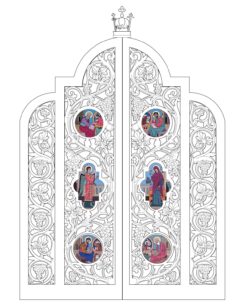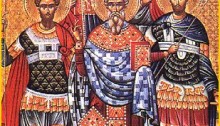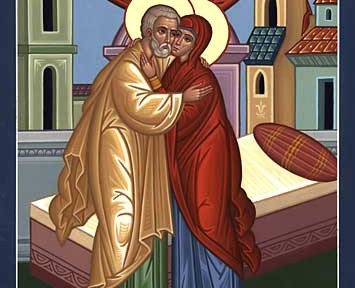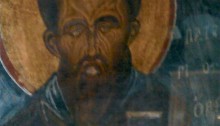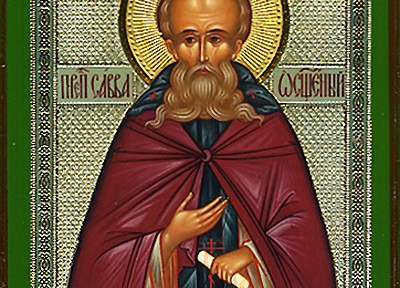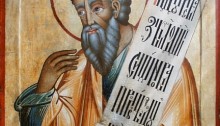These five courageous men shone like five shining stars in the dark days of the Christ-persecuting Emperors Diocletian and Maximian. St. Eustratius was a Roman commander in the city of Satalionus; Eugene was his companion in the army; Orestes was likewise a distinguished soldier; Auxentius was a priest; and Mardarius was an ordinary citizen who came, like Eustratius, from the town of Arabrak. The imperial deputies Lysias and Agricolus tortured Auxentius first since he was a priest. Seeing the innocent suffering of Christians, Eustratius appeared in front of Lysias and declared that he was also a Christian. While Eustratius was being tortured, Eugene appeared before the judge and cried out: “Lysias, I too am a Christian.” When Eustratius was led through the town of Arabrak with the other martyrs, Mardarius saw them from the roof of his house. He took leave of his wife and two young children and rushed after the martyrs, shouting into the faces of the tormentors: “I too am a Christian, like my lord Eustratius.” When St. Orestes was target-practicing in the presence of Lysias, the cross he was wearing fell from his chest and Lysias realized that he was a Christian, after which Orestes openly confessed his faith. Orestes was a young and handsome soldier and towered above all the other soldiers in stature. Auxentius was beheaded, Eugene and Mardarius died while being tortured, Orestes expired on a red-hot iron grid, and Eustratius died in a fiery furnace. St. Blaise (February 11) administered Holy Communion to St. Eustratius in prison before his death. Their relics were later taken to Constantinople and buried in the church dedicated to them: The Holy Five Companions. They were seen alive in that church, and St. Orestes appeared to St. Dimitri of Rostov (October 28). A beautiful prayer by St. Eustratius is extant, which is read at the Midnight Service on Saturday: “Most highly do I magnify Thee, O Lord.” (Prologue of Ohrid) Continue reading December 13, 2013 The Holy Martyrs Eustratios, Auxentius, Eugenius, Mardarius and Orestes and the Holy Virgin Martyr Lucy
Continue reading December 13, 2013 The Holy Martyrs Eustratios, Auxentius, Eugenius, Mardarius and Orestes and the Holy Virgin Martyr Lucy
Day: 24 November 2013
December 9, 2013 Conception of St. Anna
The righteous Joachim and Anna were childless for fifty years of their married life. In their old age the Archangel Gabriel appeared to each one of them separately, telling them that God had heard their prayers and that they would give birth to a daughter, Mary. Then St. Anna conceived by her husband and after nine months bore a daughter blessed by God and by all generations of men: the Most-holy Virgin Mary, the Theotokos. (Prologue of Ohrid) Continue reading December 9, 2013 Conception of St. Anna
Continue reading December 9, 2013 Conception of St. Anna
December 8, 2013 29th Sunday after Pentecost, Octoechos Tone 4 Our Venerable Father Patapius
Patapius was born and brought up in the Faith and in the fear of God by pious parents in the Egyptian city of Thebes. At an early age he perceived and abhorred the vanity of this world and withdrew into the wilderness of Egypt. There he devoted himself to a life of asceticism, cleansing his heart of all earthly desires and thoughts, for the sake of God’s love. However, when his virtues became known among the people, they began to come to him and to seek solace from him in their sufferings. Fearing the praise of men, which darkens the minds of men and separates them from God, Patapius fled this wilderness to Constantinople, for this wonderful saint thought that he could hide himself more easily from people in the city than in the wilderness. Patapius built a hut for himself in the proximity of the Church of Blachernae in Constantinople. There, immured and unknown, he continued his interrupted life of eremetic asceticism. However, a light cannot be hidden. A child, blind from birth, was led by God’s providence to St. Patapius. He besought the saint to pray to God that he be given his sight and be able to look upon God’s creation-thus allowing him to praise God all the more. Patapius having compassion on the suffering child, prayed to God, and the child’s sight was restored. This miracle revealed God’s chosen one throughout the entire city, and people rushed to him for healing, comfort and instruction. Patapius healed an eminent man of dropsy by tracing the sign of the Cross over him and anointing him with oil. By making the sign of the Cross in the air with his hand, he freed a youth from an unclean spirit that had cruelly tormented him. The evil spirit, with a loud shriek, came out from God’s creature like smoke. He made the sign of the Cross over a woman who had a sore on her breast all filled with worms, and made her healthy. Many other miracles did St. Patapius perform, all through prayer in the name of Christ and by the sign of the Cross. He entered into rest peacefully in great old age and took up his habitation in the Heavenly Kingdom in the seventh century. (Prologue of Ohrid) Continue reading December 8, 2013 29th Sunday after Pentecost, Octoechos Tone 4 Our Venerable Father Patapius
Continue reading December 8, 2013 29th Sunday after Pentecost, Octoechos Tone 4 Our Venerable Father Patapius
December 6, 2013 Our Holy Father Nicholas the Wonderworker, Archbishop of Myra in Lycia
This glorious saint, celebrated even today throughout the entire world, was the only son of his eminent and wealthy parents, Theophanes and Nona, citizens of the city of Patara in Lycia. Since he was the only son bestowed on them by God, the parents returned the gift to God by dedicating their son to Him. St. Nicholas learned of the spiritual life from his uncle Nicholas, Bishop of Patara, and was tonsured a monk in the Monastery of New Zion founded by his uncle. Following the death of his parents, Nicholas distributed all his inherited goods to the poor, not keeping anything for himself. As a priest in Patara, he was known for his charity, even though he carefully concealed his charitable works, fulfilling the words of the Lord: Let not thy left hand know what thy right hand doeth (Matthew 6:3). When he gave himself over to solitude and silence, thinking to live that way until his death, a voice from on high came to him: “Nicholas, for your ascetic labor, work among the people, if thou desirest to be crowned by Me.” Immediately after that, by God’s wondrous providence, he was chosen archbishop of the city of Myra in Lycia. Merciful, wise and fearless, Nicholas was a true shepherd to his flock. During the persecution of Christians under Diocletian and Maximian, he was cast into prison, but even there he instructed the people in the Law of God. He was present at the First Ecumenical Council of Nicaea [325] and, out of great zeal for the truth, struck the heretic Arius with his hand. For this act he was removed from the Council and from his archiepiscopal duties, until the Lord Christ Himself and the Most-holy Theotokos appeared to several of the chief hierarchs and revealed their approval of Nicholas. A defender of God’s truth, this wonderful saint was ever bold as a defender of justice among the people. On two occasions, he saved three men from an undeserved sentence of death. Merciful, truthful, and a lover of justice, he walked among the people as an angel of God. Even during his lifetime, the people considered him a saint and invoked his aid in difficulties and in distress. He appeared both in dreams and in person to those who called upon him, and he helped them easily and speedily, whether close at hand or far away. A light shone from his face as it did from the face of Moses, and he, by his presence alone, brought comfort, peace and good will among men. In old age he became ill for a short time and entered into the rest of the Lord, after a life full of labor and very fruitful toil, to rejoice eternally in the Kingdom of Heaven, continuing to help the faithful on earth by his miracles and to glorify his God. He entered into rest on December 6, 343. (Prologue of Ohrid) Continue reading December 6, 2013 Our Holy Father Nicholas the Wonderworker, Archbishop of Myra in Lycia
Continue reading December 6, 2013 Our Holy Father Nicholas the Wonderworker, Archbishop of Myra in Lycia
December 5, 2013 Our Venerable and God-Bearing Father Sabbas the Sanctified
The unknown village of Mutalaska, in the province of Cappadocia, became famous through this great luminary of the Orthodox Church. Sava was born there of his parents John and Sophia. At the age of eight, he left the home of his parents and was tonsured a monk in a nearby monastic community called Flavian’s. After ten years, he moved to the monasteries of Palestine and remained longest in the Monastery of St. Euthymius the Great (January 20) and Theoctistus. The clairvoyant Euthymius prophesied of Sava that he would become a famous monk and a teacher of monks and that he would establish a lavra greater than all the lavras of that time. After the death of Euthymius, Sava withdrew to the desert, where he lived for five years as a hermit in a cave shown to him by an angel of God. Afterward, when he had been perfected in the monastic life, he began by divine providence to gather around him many who were desirous of the spiritual life. Soon, such a large number gathered that Sava had to build a church and many cells. Some Armenians also came to him, and for them he provided a cave where they would be able to celebrate services in the Armenian language. When his father died, his aged mother Sophia came to him, and he tonsured her a nun. He gave her a cell located at a distance from his monastery, where she lived a life of asceticism until her death. This holy father endured many assaults from all sides: from those who were close to him, from heretics, and from demons. But he triumphed over them all: those close to him, by kindness and indulgence; the heretics, by his unwavering confession of the Orthodox Faith; the demons, by the sign of the Cross and calling upon God for help. He had a particularly great struggle with demons on Mount Castellium, where he established his second monastery. In all, Sava established seven monasteries. He and Theodosius the Great, his neighbor, are considered to be the greatest lights and pillars of Orthodoxy in the East. They corrected emperors and patriarchs in matters of the Faith, and to everyone they served as an example of saintly humility and the miraculous power of God. After a toilsome and very fruitful life, St. Sava entered into rest in the year 532, at the age of ninety-four. Among his many wondrous and good works, let it at least be mentioned that he was the first to compile the Order of Services for use in monasteries, now known as the Jerusalem Typicon. (Prologue of Ohrid) Continue reading December 5, 2013 Our Venerable and God-Bearing Father Sabbas the Sanctified
Continue reading December 5, 2013 Our Venerable and God-Bearing Father Sabbas the Sanctified
December 1, 2013 28th Sunday after Pentecost, Octoechos Tone 3 Holy Prophet Nahum
Nahum was born of the tribe of Simeon in a place called Elkosh on the far side of the Jordan. He lived about seven hundred years before Christ and prophesied the destruction of Nineveh about two hundred years after the Prophet Jonah. Because of Jonah’s preaching, the Ninevites had repented, and God had spared them and not destroyed them. In time, however, they forgot God’s mercy and again became corrupt. The Prophet Nahum prophesied their destruction, and since there was no repentance, God did not spare them. The entire city was destroyed by earthquake, flood and fire, so that its location is no longer known. St. Nahum lived for forty-five years and entered into rest in the Lord, leaving us a small book of his true prophecies. (Prologue of Ohrid) Continue reading December 1, 2013 28th Sunday after Pentecost, Octoechos Tone 3 Holy Prophet Nahum
Continue reading December 1, 2013 28th Sunday after Pentecost, Octoechos Tone 3 Holy Prophet Nahum
